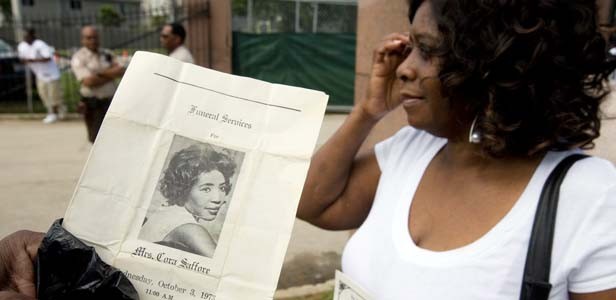
PHOTO BY ZBIGNIEW BZDAK/MCT
Angena Smith (right) holds a picture of her dead husband, Robert, and James Saffore holds a picture of his wife, Cora, as an investigation continues at Burr Oak Cemetery in Alsip, Illinois.
For once, the Rev. Jesse Jackson spoke for more than himself when he wished for “a special place in hell” for grave robbers. Providing such a place is beyond the powers of even Mr. Madigan, but the General Assembly has come up with the means to send them to an Illinois prison, which is pretty close. The Illinois Cemetery Protection Act makes it a crime (among other deeds) to willfully damage, destroy or desecrate human burial remains without proper legal authority or remove any portion of the remains of a deceased human being from a burial ground. Dare to do any of those things, boys and girls, and you have committed a Class 4 felony.
Class 4 is the lowest level felony in Illinois, and mandates the least severe punishments — a year in jail in this case. Not enough, decided prosecutors in the Burr Oak case, so they charged the accused with dismembering a human body. That statute was aimed at slice-and-dice murderers rather than grave robbers. (Happy is the man who does not sit on the jury that must decide whether disconnected human bones constitute a “body.”) However, dismemberment is a Class X felony punishable by up to 30 years in prison, and thus handy to show the public that This Kind of Thing Will Not Be Tolerated.
Unless This Kind of Thing is done by people in power. A few weeks after the Burr Oak story broke, we learned that the City of Chicago had prevailed in the appeals court against opponents of the modernization of O’Hare airport now underway. A new runway is planned to be built on land in neighboring Bensenville now occupied by St. Johannes Cemetery, a church graveyard. An offer to buy being rejected, Chicago condemned the cemetery using eminent domain, and the inevitable lawsuit was filed; barring an unexpected court ruling, the remains of more than 1,300 people eventually will be dug up and moved.
The City of Chicago thus is acting with proper legal authority to willfully and knowingly remove the remains of a deceased human being from a burial ground, but doing so with no threat of penalty. Opening a grave for private gain is illegal. Opening one — or hundreds — for municipal gain is not.
Most municipalities in Illinois have the authority to condemn and move cemeteries for the public good. Whether that is a good thing or a bad thing depends on the public good for which graves are thus violated. If removal is done for the genuine public good — that is, for the good of the citizens, guided by civic values — fine. (Many an old city graveyard was cleared as a public health hazard, including a couple in Springfield.) But land use decisions are increasingly being made to benefit cash-strapped corporate cities, according to what are essentially business values.
The City of Chicago is the leader in this kind of fiscal fiddle. Under Richie Daley it has leased a tollway and its parking meters to private owners, and wants to lease Midway Airport, all for ready cash. In Springfield, Mr. Davlin also is struggling — at least one hopes he finds it a struggle — to find enough money to keep his fiscal ship afloat. He has however not yet endorsed the model of his fellow Democrat in selling off public assets to cope with his city’s money woes.
Those assets are considerable, and include a power plant that only blows up once in a while, a lake that hasn’t filled up yet and a large cemetery that occupies one of the prettiest landscapes in the city. If a consultant has not yet pointed to Oak Ridge and told the Davlin staff, “There’s gold in them thar hills,” I will. By clearing Oak Ridge Cemetery and selling the land to a condo developer (“Finally—A Way to Live in Springfield and Overlook Mr. Lincoln!”) Springfield could really become a green city.
I’m kidding, course. There are limits, even in Illinois. The public would scream bloody murder — or whatever it is you scream when the victims are already dead. Mr. Daley for instance was sensible enough to rob graves in another mayor’s city. Even so, a mayor who can even countenance talk about closing the public library, as Springfield’s Mr. Davlin has done, might be capable of anything.
Contact James Krohe Jr. at [email protected].

